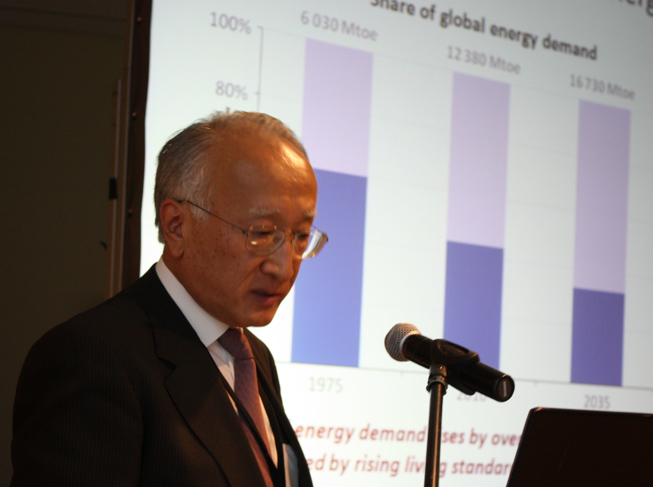The economic case for nuclear power in Japan


WARSAW -- Japan is headed for a possible economic catastrophe if it does not pursue nuclear power.
So said Nobuo Tanaka, the former director general of the International Energy Agency (IEA), in an address to the World Nuclear Power Briefing 2012 Europe conference here last week.
Tanaka noted that geopolitical uncertainties in the Middle East could double the price of oil and natural gas.
That would have disastrous consequences for Japan, which is the world's third largest importer of oil according to the U.S. Energy Information Administration, and which currently relies heavily on liquefied natural gas imports to help replace power capacity lost to the shutdown of 52 of the country's 54 nuclear reactors following meltdowns at the Fukushima Daiichi plant in March, 2011.
Tanaka said that as the U.S. grows more energy independent, it will have less incentive to patrol sea lanes including the Strait of Hormuz in the Persian Gulf - through which much of Japan's oil and a fair amount of its natural gas flow. An Israeli air strike on Iran would also adversely affect supply and prices.
"If blockage (of Hormuz) happens, the oil price will double and then the Japanese current account surplus will disappear very quickly and even go to a huge deficit," said Tanaka, who headed the Paris-based IEA from 2007 to 2011, and who is now a global associate for energy security and sustainability with Japan's Institute of Energy Economics.
He foresaw the country's surplus flipping from a $108 billion surplus in 2011 to at least a $72 billion deficit, which, he said, would undermine confidence in Japanese bonds and lead to a flight of capital and manufacturing.
"So this may lead us to a significant - not energy crisis - but an economic crisis or catastrophe," said Tanaka."The best way to at least reduce the risk is starting nuclear reactors at this moment. But the current government is in no way promoting that."
Tanaka's presentation last week preceded the election to power over the weekend of Japan's Liberal Democratic Party under the next prime minister Shinzo Abe. The LDP is expected to be more favorable to nuclear than the Democratic Party government it will replace.
The outgoing government, led by Prime Minister Yoshihiko Noda, has waffled over a commitment to phase out nuclear by 2040.
For more on Nobuo Tanaka's presentation, see my post at the Weinberg Foundation.
Photo of Nobuo Tanaka by Mark Halper.
More Japanese power, on SmartPlanet:
- Nuclear or not to nuclear: Japan struggles with the question
- Japan dials up wind energy
- How to avoid a nuclear meltdown: question authority
- Utility-scale solar plant for Fukushima
- From Fukushima’s home country: Nuclear will double
- Safe nuclear: Japanese utility elaborates on thorium plans
- Nuclear down, CO2 up in Japan, Germany
- Fukushima’s lesson: ‘Alternative’ nuclear, not ‘no’ nuclear
This post was originally published on Smartplanet.com